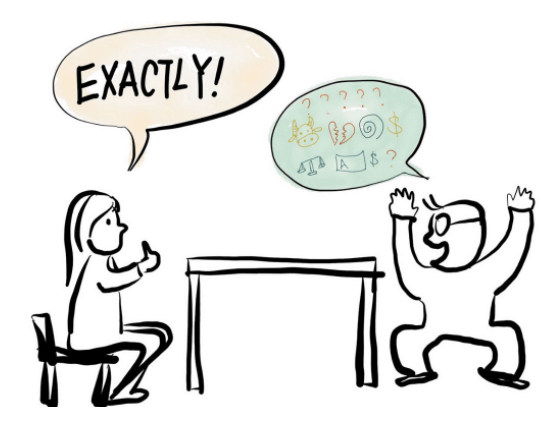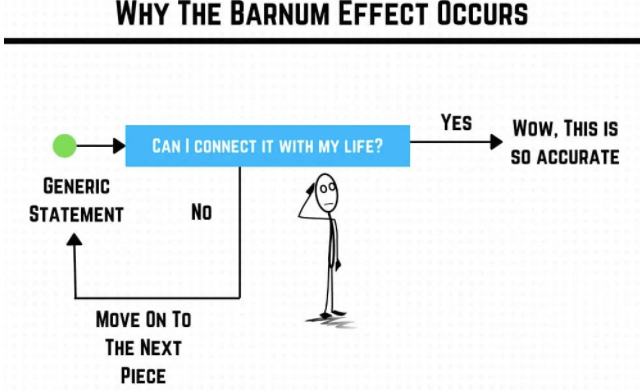
Barnum Effect: The Reason Why We Believe Our Horoscopes
“One of the studies showed that over 90% of Americans know their star signs. More than 50% of them read their horoscopes and also believe in the advice given in the descriptions.”
Barnum Effect, also known as the Forer Effect, is the psychological phenomenon that explains why individuals believe in generalised personality descriptions as if they are accurate descriptions of their unique personality. Put simply, Barnum Effect refers to our tendency to think that the information provided about our personalities is about us regardless of its generalisability.
This effect is critical in explaining the underlying mechanisms of our behavioural susceptibility to accept paranormal beliefs and practices like horoscopes, fortune-telling, and online personality tests. As mentioned above, more than 50% of the US population believes in their newspaper horoscope descriptions. Be it believing in horoscopes or personality tests: I am sure we all tend to fall for this effect at some point in our lives.

History of the Barnum Effect
The name Barnum comes from the American showman P.T. Barnum who lived during the 19th century and got famous with the coining phrase: “There’s a sucker born every minute.” Although it is unsure whether he actually said this phrase, it refers to human beings’ tendency to be gullible and to love attributing general sweeping descriptions to themselves.
Many of us are probably familiar with the name Barnum from the famous movie called The Greatest Showman. The protagonist Barnum convinced people to think that he understands them even better than they do themselves with using this effect.

Scientific Past of the Barnum Effect
The Barnum Effect, as a cognitive bias, was discovered by the psychologist Bertram Forer in 1948 when he conducted an experiment on the fallacy of personal validation. In his study, Forer’s students were given a personality test and told that each survey would be assessed separately and provided with feedback by Forer himself. However, Forer gave them the same feedback with a paragraph full of very generalised statements without letting them know. He used sentences like:
- You tend to be critical of yourself.
- Security is one of your major goals in life.
- At times you have serious doubts as to whether you have made the right decision.
Once the students received their feedback, they rated the accuracy of their profiles on a scale from 0 (poor) to 5 (perfect). Overall results showed that the mean accuracy rating was 4.3 out of 5. Thus, almost all the students took Forer’s feedback as accurate descriptions of their unique personality. Forer concluded that the results could be attributed to our tendency to be gullible and confirmed the so-called Pollyanna Principle which I will mention more in depth in the following paragraphs.
Working Principles of Barnum Effect
Considering that this effect takes advantage of our gullibility which is perhaps impactful when making life-changing decisions, it is important to learn about how this effect works in principle.
Preference for Likeability
First of all, we, as humble human beings, are predisposed to believe in positive statements about ourselves. We especially take them as accurate predictions if these statements include a reference for a desirable future event. It is simply because the positive descriptions that we attribute to ourselves feed our ego. Not to be rude, but we do like the positive adjectives that make us feel flattered. Thus, we automatically accept them as truths.
Now, I have one example for you. You can find two personality descriptions below. I would like you to choose the one that resembles your personality better.
- You are a very bad listener, and you do not take other people seriously when they have an idea.
- You are an independent thinker who likes to think outside of the box when solving problems.

I believe you chose the second description; an independent thinker. This is because probably most of us just preferred having the second personality quality more. This is how our reasoning works when also handling horoscopes and personality tests; we like the most likeable one.
Then the question is: Why do we prefer socially desirable traits, and how does it help us? By portraying ourselves as having these positive characteristics, we aim to be better integrated into society and become part of a social group. This is an innate instinct that has helped us adapt to ever-changing life conditions since the beginning of our history.
Preference for Relatability
Secondly, we are naturally prone to take information that we can relate to ourselves and connect it to our daily-life occurrences. In other words, we believe in the information matching our expectations while ignoring the parts that do not. This way, we take the generally written descriptions as unique and attribute the fitting parts to our experiences of life. Since we kind of ignore the not fitting part, we forget about them and focus on the relatable parts more.
For example, my horoscope says that: Today is the day that I will be productive and achieve a lot in my work. Isn’t it wonderful? This is exactly what I wanted to hear and needed as motivation to get on top of my assignments like writing this article right now… This is why I can totally relate to this piece of information and believe that it will come true.
Pollyanna Principle
Another psychological phenomenon that explains the working principles of the Barnum Effect is the Pollyanna Principle (a.k.a the positivity bias). This bias is people’s tendency to remember pleasant events more accurately than negative ones. It makes sense, right? Why would anyone want to remember things that make them feel unhappy or unpleasant? We basically love happy memories when we recall them. It is the same idea in the case of the Barnum Effect; we prefer the positive descriptions attributed to ourselves. This is why Forer (1948) also thought that these two biases were likely to explain each other’s presence in our decision making.
Barnum Statements
Barnum Effect is manifested in response to statements called the Barnum Statements. These statements are vague and inclusive to all in their formulation, but somehow they seem to be specific when individuals read them. Also, these statements are highly accepted because most of the time what’s written in them is applicable for the majority. In other words, although we think they are special for us, if you analyse what they actually say, the Barnum Statements can be written for anyone and everyone.
The writers of horoscope descriptions and mediums use these statements to put their subjects at ease and make them more receptive to the information that they want to convey. You can find the list of some Barnum Statements below.
Barnum Statements Examples
- You have a great deal of unused capacity that you have not turned to your advantage yet.
- Something that you have been waiting for will happen shortly, and you will feel more confident.
- There are so many people around you who are waiting for you to open your eyes and find them.
- You critically analyse yourself in your duties.
- You are often very good at compensating for your weaknesses.
- Fairness is a core value for you.
Examples of Barnum Effect
There are various aspects that the Barnum Effect influences our lives. From the way we choose to use our social media platforms to things that we want to read and learn. I will discuss two of the most common instances that we fall for this bias in the following paragraphs.
Barnum Effect in Astrology, Magic & Fortune Telling
Horoscopes have been around for at least 2,000 years. Since then, we love reading about zodiac signs and making interpretations about them. Many of us probably have been to a fortune-teller, palm reader, or a psychic once in our lifetime. Among others, one of the main reasons behind our acceptance of pseudosciences is, as mentioned, the Barnum Effect. Thus, we can say that the writers of horoscope descriptions, fortune tellers, and magicians are quite the masters of understanding human psychology and applying the principles of the Barnum Effect in their interpretations.
An important concept to mention in this sense is the practice of cold reading. Cold reading implies that the practitioners of pseudoscience know much more about their subject than the subjects know about themselves. This practice is cold reading because the practitioners base their guesses without any acquisition of prior knowledge about their subject. An example of such cold reading would be: “You have a great deal of energy when handling problems that you face in your life. However, you are not yet aware of your capacity. I recommend you to give some time to discover this side of yourself and you will see what I mean.” As you can tell, what I just said was very general and applicable to many situations for a lot of people.
Also, cold-readers are very good readers of their subject’s body language and gestures. They know how to collect a great deal of information about one’s life and experiences in a sneaky way. Then, they construct their guesses safely and use personalisation so that the subjects take them seriously and cherry-pick the predictions which can actually occur in the future. This is how such practices work and use the Barnum Effect’s working principles.

Barnum Effect in Social Media Platforms
Social media platforms like Spotify and Netflix also make use of this effect when it comes to managing the experience of their users. These platforms customise information for their users and present it to them in the way that they want to see. In other words, they personalise their content for their users. For example, both Spotify and Netflix have the “recommended for you” section on their main page. Both of these websites create automated content based on the user’s earlier preferences. However, when we see the special for you content presented in a more customised way, we are automatically nudged to believe that they are handpicked. Then, it is of course more likely for us to listen and watch the recommendations by their platforms…
As you can see below, Spotify creates a ‘Uniquely yours’ section including lists of your top songs from the last year and hits that you kept playing on repeat. In this way, Spotify makes the application perceived more customised and uses the Barnum Effect to their advantage to increase user visits.

As well as Spotify, the same thing goes for Netflix. As we are familiar with, Netflix likes to email movie suggestions that are relevant for each of their subscribers. They often say: “You can find your top movies on Netflix.” Although there are probably hundreds of others who have received very similar movie recommendations by Netflix, we still fall for the trick and have a look at the personalised movie section created ‘specially for us‘. Nevertheless, we like the information tailored for our preferences anyway, right?
How to Avoid Barnum Effect?
Although as fun as it sounds, the Barnum Effect has its dark side considering its impact on our decision-making and reasoning. Knowing some of the ways to avoid the effect as much as possible can help you in the long run.
Raising awareness & skepticism to situations in which the Barnum Effect appears.
Being aware of this bias’ presence in our daily life is the first step when minimising its role in our decision-making. By doing this, we can learn to get more skeptical when we are given feedback about ourselves. It would help avoid being gullible and prevent us from making spontaneous and not well-thought decisions.
Staying vigilant and looking for evidence when you identify Barnum Statements.
Probably many of us are aware that a good assessment of our personalities should base its analysis on facts. However, we still tend to believe somehow a random fortune teller or a BuzzFeed quiz know us better than anyone else. However, always keep in mind that while it might be fun to take tests in a magazine and consult a fortune teller, these sources often have no scientific basis and broadly structure their wording to reach everyone and anyone.
Key Take-Aways
- The Barnum Effect explains our tendency to believe in generalised personality descriptions and take them as accurate descriptions of ourselves.
- We naturally prefer to believe in positive statements about ourselves, especially if they include a reference for a desirable future event.
- We are prone to take information that we can relate and connect it to our daily-life occurrences. In other words, we believe in what matches our expectations while ignoring the parts that do not.
- The Pollyanna Principle (a.k.a the positivity bias) is people’s tendency to remember pleasant events more accurately than negative ones.
- The practice of Cold reading uses the principles of the Barnum Effect. The practitioners of cold reading base their guesses without any acquisition of prior knowledge about their subject.
- Barnum statements are vague and inclusive to all in their formulation. This is why they are highly accepted by the majority.
- Spotify and Netflix also use the Barnum effect when managing their user experience. They customise information and present it to the customer in the way that they want to see.
If you want to learn more about behavioral insights, read our blog or watch 100+ videos on our YouTube channel!
About Neurofied
Neurofied is a behavioral science company specialized in training, consulting, and change management. We help organizations drive evidence-based and human-centric change with insights and interventions from behavioral psychology and neuroscience. Consider us your behavioral business partner who helps you build behavioral change capabilities internally.
Since 2018, we have trained thousands of professionals and worked with over 100 management, HR, growth, and innovation teams of organizations such as Johnson & Johnson, KPMG, Deloitte, Novo Nordisk, ABN AMRO, and the Dutch government. We are also frequent speakers at universities and conferences.
Our mission is to democratize the value of behavioral science for teams and organizations. If you see any opportunities to collaborate, please contact us here.
References
- Campion, N. (2016). Astrology and popular religion in the modern west: Prophecy, cosmology and the new age movement. Routledge.
- Decision Lab. (2021, February 10). Why Do We Believe Our Horoscopes? Retrieved February 25, 2021, from https://thedecisionlab.com/biases/barnum-effect/
- Forer, B. R. (1949). The fallacy of personal validation: a classroom demonstration of gullibility. The Journal of Abnormal and Social Psychology, 44(1), 118.
- Gearon, M. (2018, August 26). Cognitive Biases — The Barnum Effect [Web log post]. Retrieved from https://michaelgearon.medium.com/cognitive-biases-the-barnum-effect-b051e7b8e029
- Jain, E., & Mukerjee, A. Barnum Effect: Influence of Social Desirability, Base Rate and Personalization.
- Kotamarthi, P. (2020, December 05). The science behind the Barnum effect. Retrieved February 25, 2021, from https://thedecisionlab.com/insights/business/the-science-behind-the-barnum-effect/
- Vohs, K. D. (2016, August 1). Barnum Effect. Encyclopedia Britannica. https://www.britannica.com/science/Barnum-Effect
